Interested in Alternative Investments?
At HUDSONPOINT capital, we don’t just manage investments — we craft a bespoke strategy centered around you. As your dedicated family office, we align every advisor and handpick opportunities from over 200+ institutional funds to build a diversified portfolio that grows and protects your wealth. By identifying low-correlation alternative investments with high-potential growth opportunities, we aim to unlock exclusive value.
What Is Private Credit?
Private credit comprises loans and debt investments issued by private entities, as opposed to traditional financial institutions such as banks. Also known as alternative lending, these loans are often originated for businesses, infrastructure projects, or real estate ventures that need tailored financing solutions.
This type of alternative lending plays a vital role in the financial ecosystem by filling in funding gaps left by banks, especially in the wake of tighter regulations. Private credit spans a broad spectrum of risk and return profiles, making it a versatile tool for portfolio construction.
Private Credit Market Opportunity
The private credit market continues to experience robust growth. The number of privately held companies is steadily rising, and more are staying privately owned for longer. These businesses all require private credit solutions to fuel their growth.
It’s a multi-trillion-dollar opportunity — and a potentially lucrative opportunity for investors seeking both income and diversification.
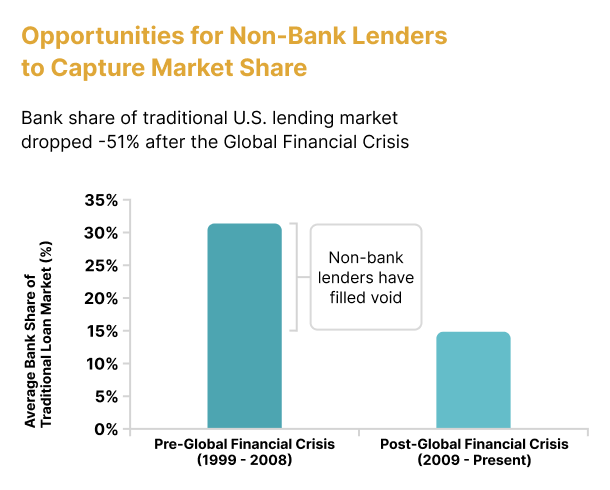
Source: T. Rowe Price.
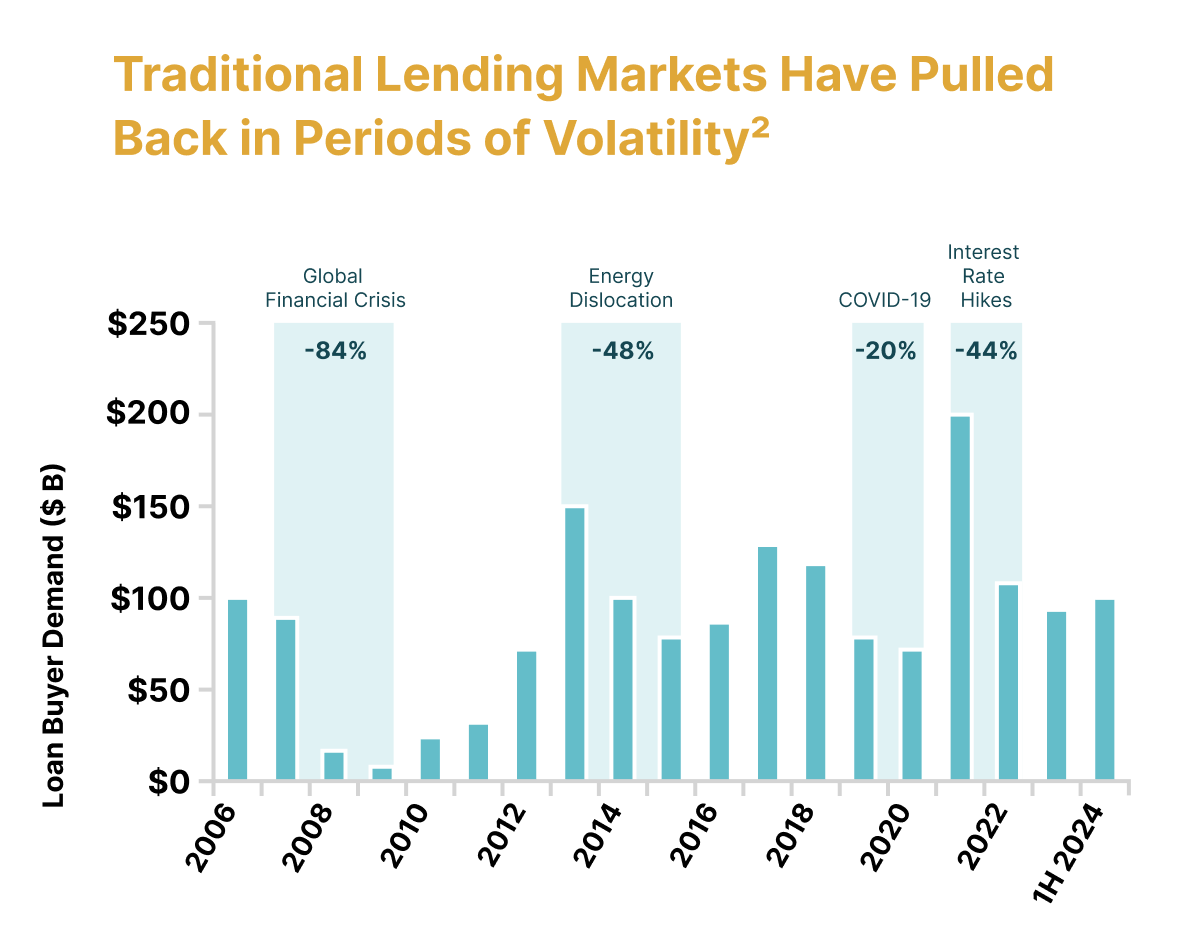
Why Invest in Private Credit?
Private credit offers a compelling blend of yield, resilience, and flexibility that sets it apart from traditional public market assets. Below are the key considerations for investors.
Consistent Income Generation
Like traditional bonds, private credit provides regular income through contractual interest payments. But unlike many fixed-income products, private credit loans are often senior secured and privately negotiated, giving investors both priority in repayment and stronger downside protection. Historically, these structures have supported steady cash flows.
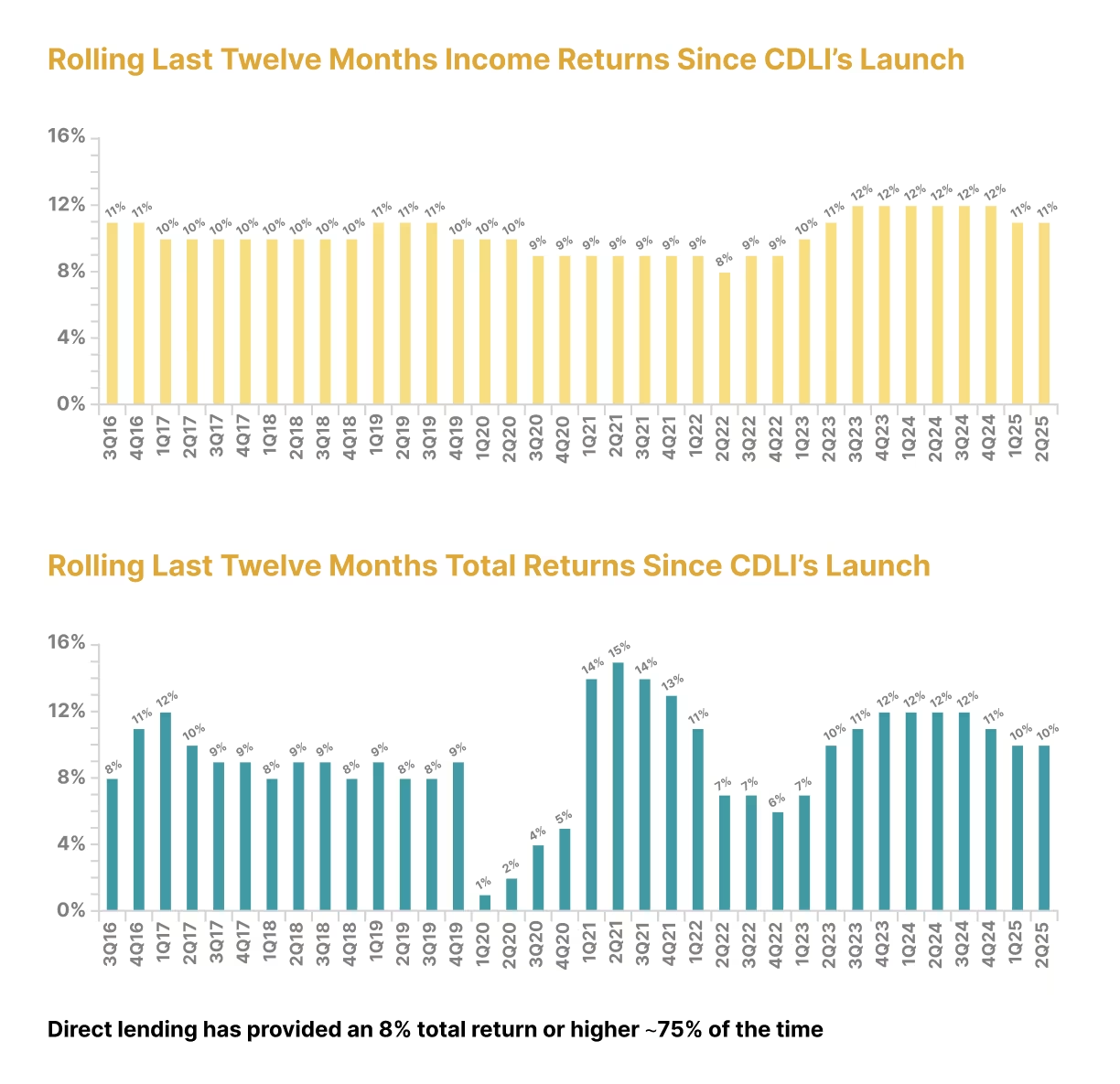
Attractive Risk/Reward Profile
Private credit has historically offered a superior risk-adjusted return profile compared to equities, high-yield bonds, and leveraged loans. Over the past two decades, the asset class has delivered higher returns with lower volatility, making it a valuable diversifier. This resilience has been particularly notable during higher interest rates and weaker equity markets.

Enhanced Return Potential
Recent market dynamics—such as higher base rates (SOFR), wider credit spreads, and original issue discounts—have expanded the return potential for private credit investors. By focusing on directly originated loans and capitalizing on areas underserved by traditional banks, private credit managers can capture opportunities with premium yields and strong protections.
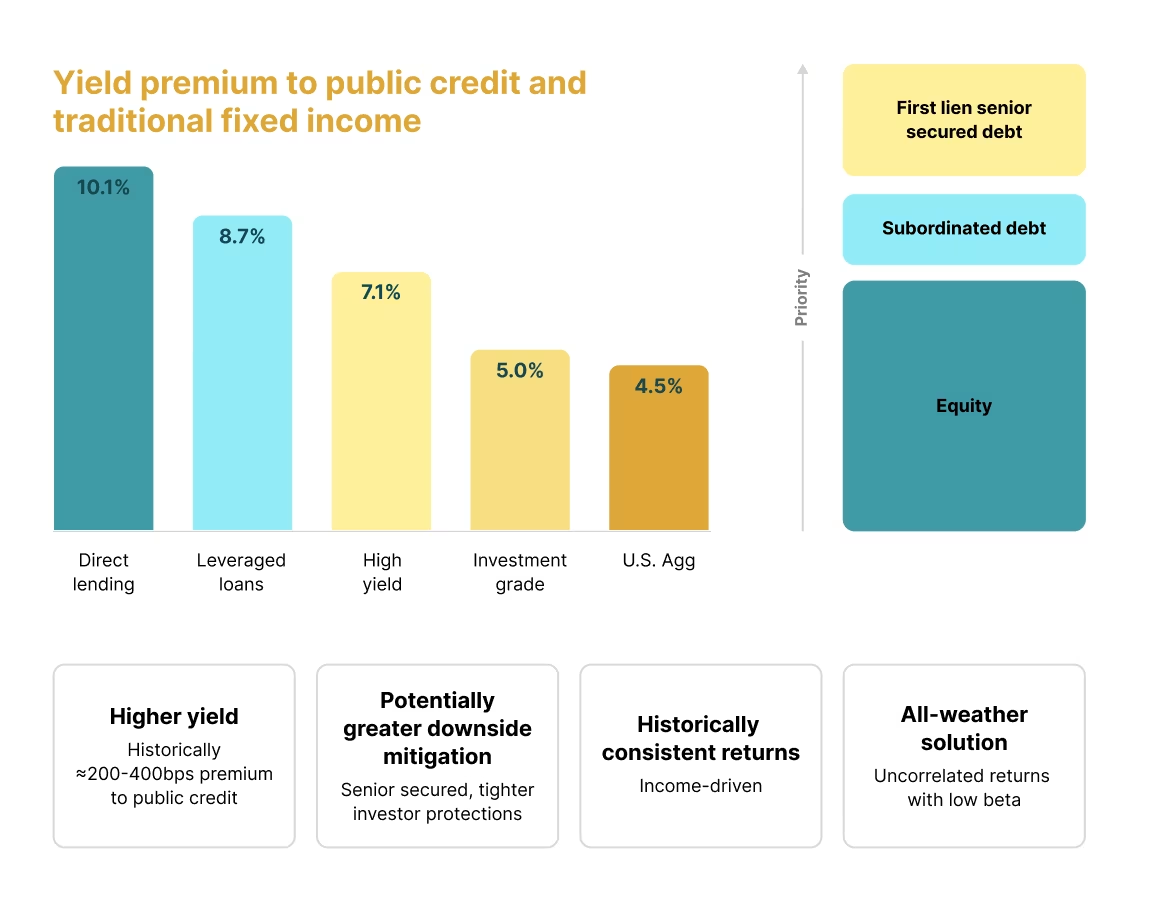
Customizable Strategies
Private credit deals are negotiated directly with borrowers, offering investors greater term control than public alternatives. Structures can include covenant protections, custom rate floors, and bespoke repayment schedules. For borrowers, this provides certainty and efficiency. For investors, it means exposure is tailored to very specific risk-reward ratios and investment goals.
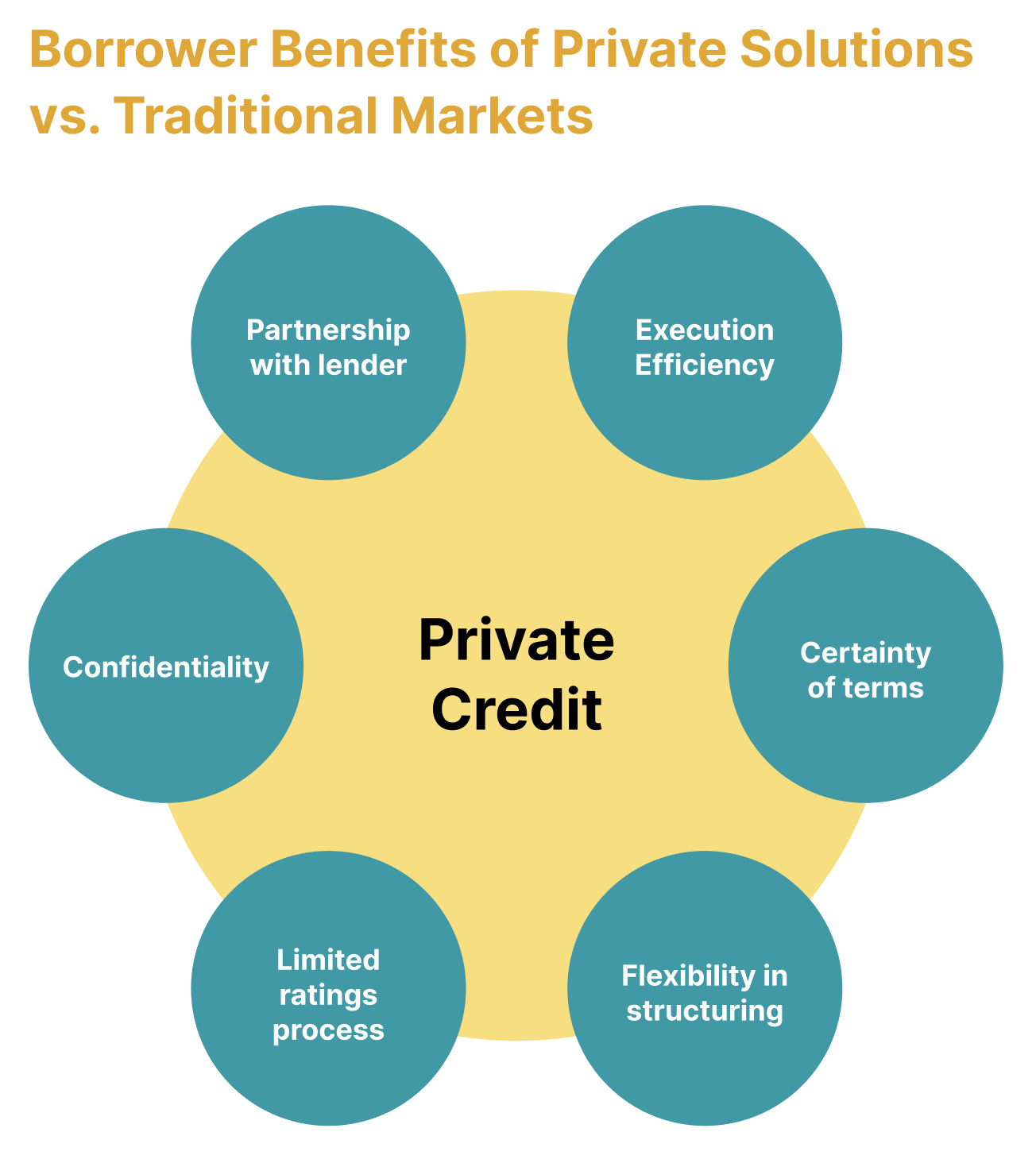
Inflation Hedge
Since the Global Financial Crisis, banks have steadily slashed their share of lending. Private lenders have stepped in to fill the gap, establishing themselves as a reliable, long-term source of financing even during volatility. Today, private credit makes up nearly $3 trillion of the $4 to $5 trillion global leveraged finance market and continues to grow, creating new opportunities for investors."
Inflation Protection
Most private credit loans are floating-rate, meaning yields adjust upward when interest rates rise. This feature provides a natural hedge against inflation and protects purchasing power—an advantage over fixed-rate bonds, which lose value as rates climb. In today’s uncertain rate environment, this makes private credit especially attractive as a portfolio stabilizer.

HUDSONPOINT capital's team of professionals will help you discover the world of alternative investments.

Overcoming Barriers to Entry
Historically, private credit opportunities were limited to institutional investors or those with substantial capital. Minimum investments can often range from $1 million to $10 million, making private credit inaccessible to most individual investors.
At HUDSONPOINT capital, we democratize access to private credit by pooling client capital and lowering the minimum investment requirement to $100,000. This approach empowers qualified investors to access institutional-grade opportunities while benefiting from expert curation and management.
Our pooled investment model ensures even those with smaller capital commitments can diversify across multiple private credit strategies, reducing concentration risk and enhancing overall returns.
HUDSONPOINT capital’s Private Credit Solutions
At HUDSONPOINT, we offer access to private credit funds managed by top institutions, including Blackstone, Carlyle, BlackRock, Apollo, and many more. These funds execute various private credit strategies, including:
Direct Lending
Through our platform, you can invest in direct lending funds managed by leading private credit firms. These funds provide loans to middle-market businesses with specific needs, such as growth capital or expansion. Tailored to a firm’s unique capital structure and aligned with its financial objectives, these loans typically yield higher returns than traditional corporate bonds.
Syndicated Deals
These types of transactions involve pooling capital from multiple investors to provide loans to large companies, spreading risk across multiple investors. Syndicated deals typically offer lower returns but come with greater diversification and lower individual risk.
Liquid Credit
A form of financing that provides liquidity by purchasing publicly traded debt at a discount. Liquid credit offers flexibility, allowing investors to access the debt markets while still maintaining the potential for high returns. However, these investments typically come with greater volatility and risk, particularly in terms of market fluctuations.
Opportunistic Credit
Investments in debt secured by commercial or residential real estate, or businesses facing temporary challenges. These investments typically feature steady income streams backed by tangible assets. Opportunistic credit can also encompass special situations, such as turnaround financing or recapitalizations, where recovery or restructuring yields attractive returns.
Hybrid Capital
A combination of debt and equity financing that is used in unique opportunities like turnaround financing, recapitalizations, or distressed debt investments. This strategy offers the potential for outsized returns in exchange for higher risk, particularly when the underlying company or asset is undergoing transition or restructuring.
Infrastructure Credit
Investments in projects or assets related to essential infrastructure, such as transportation, energy, or telecommunications. Infrastructure credit typically offers long-term, stable returns, backed by tangible, critical assets. This type of credit can provide a hedge against economic volatility and inflation.
What Are The Risks of Private Credit?
While private credit offers attractive opportunities, it also carries inherent risks that investors should consider:
Credit Risk. The main concern of private credit is borrower default. While many private credit investments are secured by assets,defaults can still lead to delayed or reduced returns.
Illiquidity. Private credit investments are often long-term and lack secondary markets, making it difficult to exit positions quickly. This illiquidity typically requires a multi-year commitment from investors.
Economic Sensitivity. Economic downturns or market shifts can affect a borrower's ability to repay loans, particularly in sectors such asreal estate or distressed debt.
Interest Rate Risk. While floating interest rates can offer an inflation hedge, rising rates may impact borrowers’ repayment capacity,increasing default risks.
Limited Transparency. Private credit markets are less regulated, which can lead to variable reporting standards and reduced visibility into underlying assets.
Manager Dependence. The success of a private credit investment often relies on the expertise of fund managers. Poor management decisions can negatively impact returns.
Take the Next Step
Are you looking for consistent income, diversification, or enhanced returns? Private credit offers a unique opportunity to earn stable returns, often with yields higher than traditional bonds.
At HUDSONPOINT capital, we don't just provide investment access—we create a customized strategy for your financial future. As your trusted financial partner, we leverage our relationships with leading institutional credit firms like Blackstone, Carlyle, and Apollo to give you access to top-tier private credit funds.
With our exclusive access to institutional-caliber private credit opportunities, we help you navigate this asset class with confidence and precision. We align every advisor, asset, and strategy around one goal: growing and protecting your wealth.
Ready to secure steady returns and diversify your portfolio? Schedule a consultation today.


.jpg)

.jpg)




